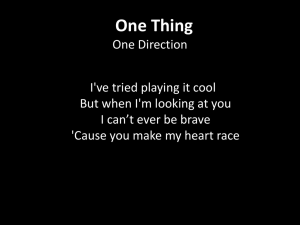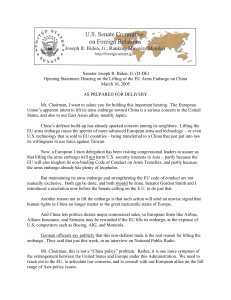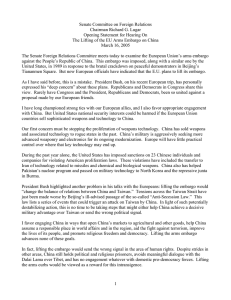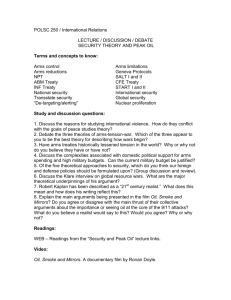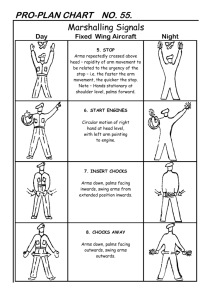“The Lifting of the EU Arms Embargo on China”
advertisement
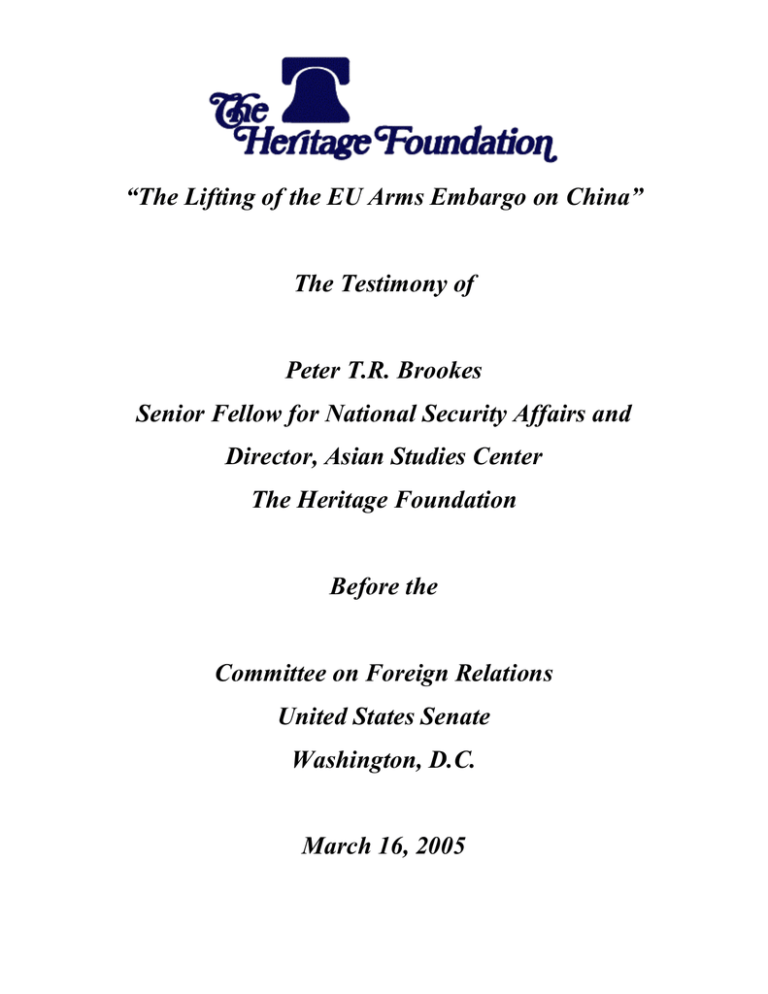
“The Lifting of the EU Arms Embargo on China” The Testimony of Peter T.R. Brookes Senior Fellow for National Security Affairs and Director, Asian Studies Center The Heritage Foundation Before the Committee on Foreign Relations United States Senate Washington, D.C. March 16, 2005 The Heritage Foundation is a public policy, research, and educational organization operating under Section 501(C)(3). It is privately supported, and receives no funds from any government at any level, nor does it perform any government or other contract work. The Heritage Foundation is the most broadly supported think tank in the United States. During 2004, it had more than 200,000 individual, foundation, and corporate supporters representing every state in the U.S. Its 2004 income came from the following sources: Individuals 56% Foundations 24% Corporations 4% Investment Income 11% Publication Sales and Other 5% The top five corporate givers provided The Heritage Foundation with 2% of its 2004 income. The Heritage Foundation’s books are audited annually by the national accounting firm of Deloitte & Touche. A list of major donors is available from The Heritage Foundation upon request. Members of The Heritage Foundation staff testify as individuals discussing their own independent research. The views expressed are their own, and do not reflect an institutional position for The Heritage Foundation or its board of trustees. 2 The Lifting of the European Union Arms Embargo On China Mr. Chairman, Members of the Committee, it is an honor and privilege to appear before you today to discuss the European Union’s pending decision to lift its arms embargo against China. I want to commend you for holding this very timely hearing as there are many questions being asked on both sides of the Atlantic—and in Asia-- that should be addressed in a prestigious, open forum such as this. I am testifying here today as an individual and my views do not necessarily reflect the views of my employer, The Heritage Foundation. Later this year, the European Union (EU) will consider lifting the Tiananmen Square arms embargo against the People’s Republic of China (PRC). The United States and the EU imposed the embargo following the June 1989 crackdown on democracy protestors in Beijing. Lifting the embargo would endanger U.S. interests, accelerate China’s military buildup, undermine stability in the Pacific, and send the wrong signal to repressive regimes everywhere. American Concerns The U.S. is rightfully troubled by the proposed EU policy change. First, there is concern about China’s refusal to renounce the use of force against Taiwan. In light of China’s ongoing military buildup, Beijing might decide to coerce or take 3 military action against Taiwan to force unification. Its recent passage of an “AntiSecession” law directed at Taiwan, which may have been encouraged by the pending EU decision, is not encouraging. But more to the point, the sale of EU arms to China would mean that European weapons might be used against American servicemen in a military confrontation over Taiwan. Second, lifting the EU arms embargo would exacerbate the ongoing shift in the balance of power across the Taiwan Strait. In the next few years, the cross-Strait conventional military balance of power will move decidedly in Beijing’s favor. This change might lead Beijing to perceive an ability to resolve Taiwan’s political future through force. Considering the political, economic and military issues at stake in Northeast Asia, a Chinese miscalculation of this sort has the potential for catastrophic results. Third, in some quarters there is significant concern that China wants to succeed the U.S. as the preeminent power in the Pacific. Increased Chinese military might derived from EU arms sales or technology transfers could at some point allow Chinese forces to deter, delay, or deny American military intervention in the Pacific—or replace the United States as the premier military power in Asia. Though many Asian countries welcome China’s economic opportunities, they are wary of Beijing when it comes to security matters. Some strategists believe that beyond unification with Taiwan, China also has an eye towards subjugating Japan, controlling heavily-traveled Asian sea lanes, projecting power into the Indian Ocean and dominating Southeast Asia. Japan has already expressed their concern with the EU’s proposed policy change. Fourth, China’s handling of advanced conventional arms, WMDs, and ballistic missiles is of great concern. The PRC’s export control laws and practices leave a 4 lot to be desired. Willful government-supported proliferation is even more troubling. China’s relationship with North Korea, Iran, Burma, or even Syria could lead to sensitive European technology falling into the wrong hands. Finally, China’s human rights record remains deeply troubling and scarcely merits reward. Just in 2004, Chinese security services harassed and detained justiceseeking mothers of Tiananmen Square victims, as well as political activists and Internet users. In fact, some suggest that China’s human rights record has regressed since 1989. Once the arms embargo is lifted, the EU will lose significant leverage with China over human rights. In addition, ending the arms embargo would send the wrong signal to other repressive regimes. European Motivations So why is Europe considering this change? Many believe that the EU is trying to curry favor with China for preferential commercial treatment. China is one of the world’s most dynamic economies, and lifting sanctions may lead to large commercial deals for EU firms. If the political climate is right, the PRC may also look to EU companies for high-speed rail, telecommunications, satellites, energy plants, and even high-end nuclear plants as China’s insatiable appetite for energy grows. A second and more sinister reason for the policy change is to open a new arms market for European weapons in China. The PRC is a veritable cash cow for arms sales. China’s defense budget—now the world’s second largest—runs $50-$70 billion a year, including plenty of money for arms purchases. With declining defense budgets across Europe, China provides a golden opportunity for Europe’s beleaguered defense firms to sell arms in a growing market. 5 Third, from a political perspective, some EU members are looking for political cover. Should the new arms policy go awry (e.g., the use of EU weapons on political dissidents, Tibetans, or Uighurs), political responsibility for the policy change would be spread across the breadth of the EU’s membership. By working under the EU’s umbrella, some states will inoculate themselves from their constituents’ disapproval for backing down on China’s human rights record. Lastly, and on the most cynical end of the scale, some believe that the EU, especially France, is attempting to balance American global power through the development of a “multipolar” world. In such a political construct, other power centers such as China, Russia, Japan, India, and the EU could counterbalance American power. Thus, making China more powerful would help Europe challenge the United States’ global pre-eminence. Chinese Motivations No doubt China has motivations of its own. First, Beijing continues to seek political absolution for the Tiananmen Square massacre among the international community. The recent death of former Communist Party leader, Zhao Ziyang, is a nail in the coffin of the requirement that the Chinese government account for its actions at Tiananmen; the lifting of the EU embargo would be another. Second, China is looking for competitive pricing and alternative sources for the arms it currently buys from Russia, its main advanced-technology arms supplier. With the U.S. and EU currently out of the Chinese arms market, it’s a seller’s market for the Russians. EU arms can compete with the Russian arms producers in terms of quality and (possibly) price. This would create a buyer’s market for Beijing, decreasing 6 dependence on Russian arms and enhancing the likelihood of generous advancedtechnology transfers to the Chinese arms industry as part of any arms deal. The Chinese may also be hoping that the EU’s decision will lead to pressure in Washington from defense firms to lift the embargo. Third, Beijing is hunting for military technology it can’t find elsewhere, especially in the Russian market. The Chinese can find top-notch fighters, diesel submarines, destroyers, and surface-to-air missiles in Russia, but they may not be able to find the necessary command, control, communications, computers, intelligence, surveillance, and reconnaissance (C4ISR) systems they need to make these systems more effective. The EU may be just the source for such systems. Fourth, Beijing would also like to drive a wedge into the transatlantic alliance. China certainly would not object to having an ally in the EU, especially when jousting with the United States in the UN Security Council or other multilateral institutions over such issues as Iran’s nuclear program (where China just signed a $70 billion gas/oil deal) or Sudan (where China recently penned a $3 billion oil deal.) Fifth, it should come as no surprise that a lifting of the arms embargo would be seen as a significant political defeat for the Taiwanese in Europe and would support China’s desire to isolate Taiwan from the international community in hopes of forcing an early unification. Some would argue that if the Europeans sell arms to China, they should sell them to Taiwan as well. Conclusion There are sure to be consequences to the transatlantic relationship over a decision to lift the arms embargo against China. Even with the President Bush’s and 7 Secretary of State Rice’s highly successful trips, America’s perception of Europe, already troubled, will not be improved. Americans, especially veterans, would gasp at the thought that European arms might be used against American servicemen and women in a Taiwan or Korean contingency. Americans will rightfully resent a decision on the part of the Europeans that will negatively alter the security situation in a region (i.e., the Pacific) where the Europeans have no responsibility for stability or security. Even with the advent of a new code of conduct for arms sales and other regulations, the Bush administration is right to be displeased. The EU decision will also roil the waters of the Pacific. Japan is already alarmed by China’s military buildup and has serious questions about China’s strategic ambitions in Asia beyond Taiwan. Taiwan, already unsettled by the passage of the anti-secession law, is unlikely to sit idly by. An EU decision to lift the embargo will likely set back the recent progress across the Taiwan Strait. The United States should welcome China’s peaceful integration into the international community as an open and free society through commerce, tourism, academic exchanges, and official dialogue. These activities maximize the free world’s efforts to encourage positive political and social change for 1.3 billion Chinese. But in the end, the EU’s decision to lift the arms embargo against China will not help close the transatlantic divide and may even widen it. The EU decision will also be perceived as an imprimatur for dismal human rights records everywhere. It may also have a destabilizing effect on Northeast Asia, especially across the Taiwan Strait. Finally, it could increase the likelihood of military conflict in the Pacific, which is no one’s interest—not even the distant EU’s. Thank you, Mr. Chairman. 8 Peter Brookes is a Senior Fellow for National Security Affairs and Director of the Asian Studies Center at The Heritage Foundation. Prior to joining Heritage, he served as a Deputy Assistant Secretary of Defense (Asian-Pacific Affairs), a Professional Staff Member with the House International Relations Committee, with the CIA, the State Department and the U.S. Navy. 9
